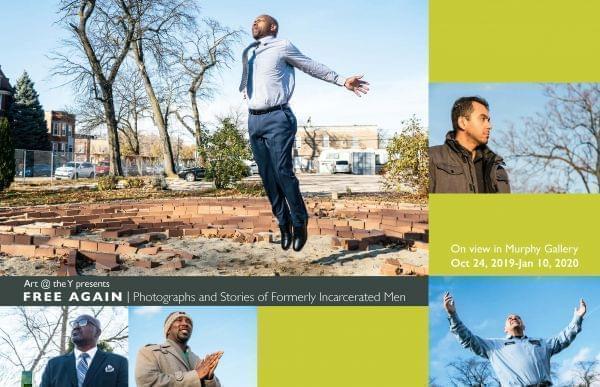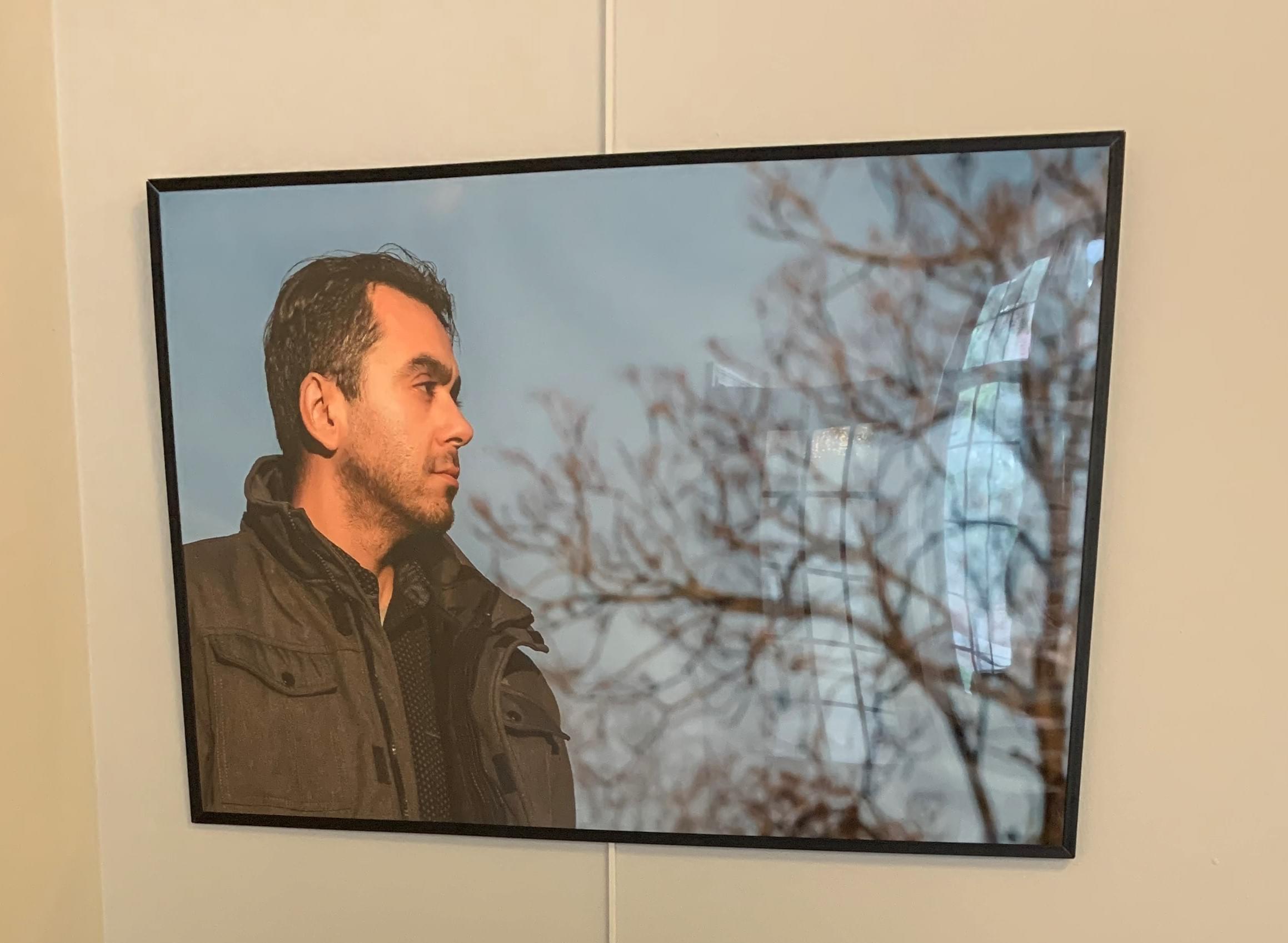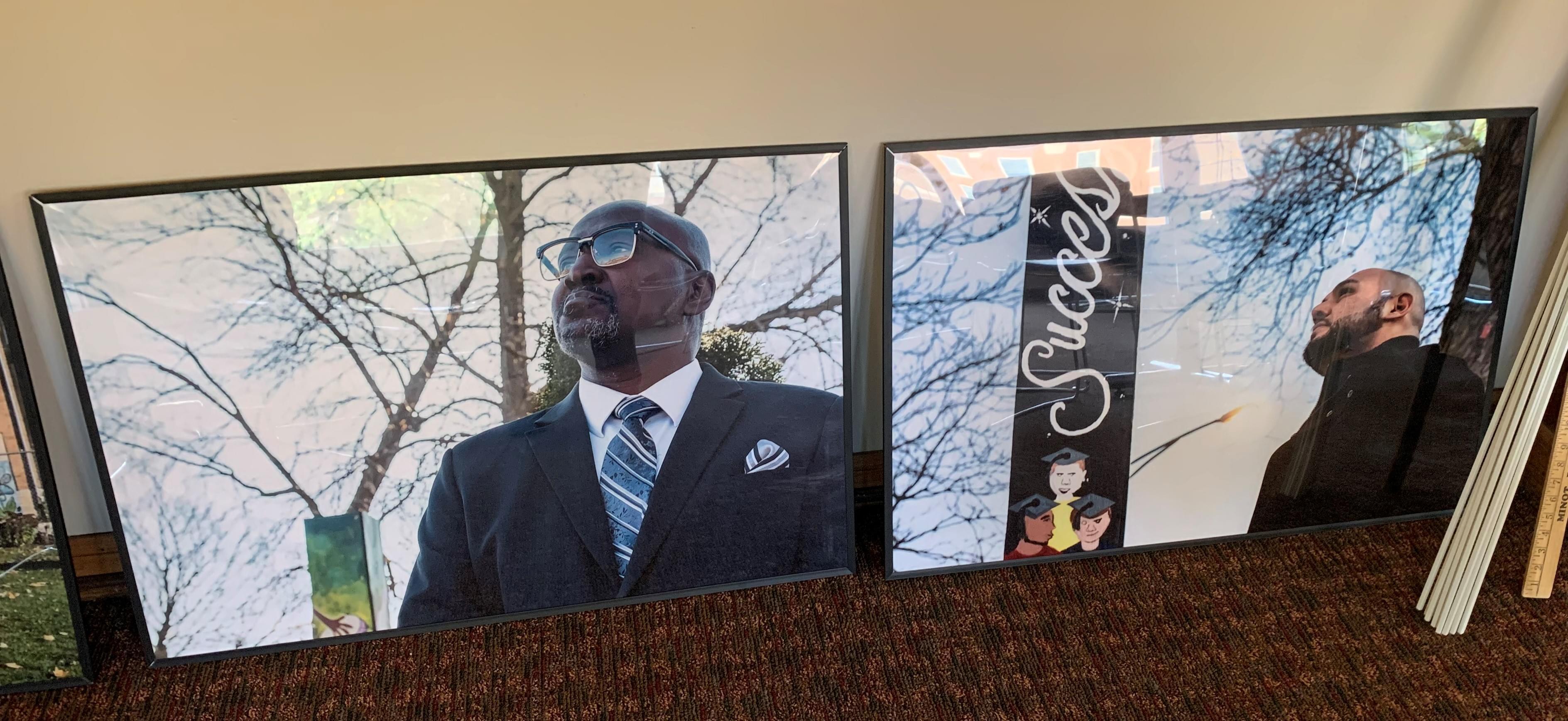New Exhibit Challenges Beliefs About Value & Morality Of Long-Term Incarceration

Courtesy of University Y and the Education Justice Project
A new exhibit at the University Y in Champaign takes an up-close look at what it’s like to serve an extensive prison sentence.
The exhibit is called “Free Again.” It’s a partnership with the University of Illinois’ college-in-prison program, Education Justice Project.

Michael Tafolla served a 20-year prison sentence and was released in 2018. He's one of 18 men whose stories are featured at the new University Y's Art @ the Y exhibit.
The exhibit features the stories of 18 formerly incarcerated men. Many of them, like Michael Tafolla, were sentenced at a young age.
Tafolla said throughout his 20-year sentence, he worked to better himself through programs like EJP.
He was released in 2018 and now works a with a nonprofit in Chicago that helps young people at risk of gang and justice involvement get their lives back on track.
Tafolla said he’s telling his story through the exhibit to help people understand the severe mental and emotional toll of long-term incarceration.
“When we read someone’s story, when we connect with someone, when we engage someone, it affects us,” Tafolla said. “Sometimes it makes people uncomfortable, oftentimes it makes people angry and it makes people hurt because these are human lives, and this is another way that our society is doing something negative.”
The photgraphs and stories highlight how men like Tafolla have emerged as strong and caring individuals, despite the extreme difficulties growing up in prison.
“‘Free Again’ is a powerful and visually arresting exhibit that will encourage viewers to question the value and morality of long-term incarceration, and perhaps even of penal incarceration itself,” said EJP Director Rebecca Ginsburg in a news release.
The opening reception for the exhibit begins at 5 p.m. tonight at the University Y in Champaign. Tafolla will be among the speakers at the event. The show will be on view through January 10, 2020.
Tafolla spoke with Illinois Public Media about his experience.
This interview has been lightly edited and condensed for clarity and length.
Christine Herman: When you say that being incarcerated for 20 years takes a mental and emotional toll, I imagine that there's a lot packed into that idea. How do you explain that in a simple way?
Michael Tafolla: One of the things is like what you're reduced to. You're not treated humans. And this is for 20 years. And yeah, there's a couple of officers, there's a couple of counselors, there's couple of teachers throughout the years that you run into. It's very few that will treat you as a human being and will give you respect. But for the most part, 95% of them, 97% of them, 99% of them, don't give a f***. They don't recognize your humanity, and they don't care about it.
To be kept in a cell 20 plus hours a day, to be constantly lied to, talked down to, to not have opportunities. I know how fortunate I am to get into EJP, to get into college classes to get my associates and different things like that. But there's not enough classes for everyone. And there's so many people that don't get into classes, they just stay on waitlists. It took me seven years to get into class to my GED. I kept sending requests, like man, 'I've been waiting, you know, three years, five years, hey you told me I was gonna get in in the next six months.' And they get tired and they finally put me in. But had I not done that, who knows how long it would have been before I would've got my GED. It's ridiculous and I can't do nothing else because I need my GED in order to do everything else. And then you're in a cage and you can't even look out the window. And when you do look out the window, or you see are more cages or a wall. It's a lot, and it's 20 years of it.
And I understand the other side, and I always speak on that, like, look, at the end of the day, I'm a convicted murderer. At the end of the day, I took someone's life, someone's baby. I did harm in society for a few years. I recognize all that, you know. And I own all that and I carry that with me every day. I don't use it as negative, I don't sit and cry about it. I own it; I did it. Now I'm using that as fuel. I carry that guilt, and that fuels me every single day. And I use it as fuel to do my job that much better, to work that much harder, to impact lives that much more significantly.
My current job at Precious Blood Ministry of Reconciliation, a nonprofit on the south side of Chicago. I'm a case manager and also a trauma-informed care facilitator. And we're dealing with high-risk youth, young men and young women. And we're having a dialogue of trauma and all that, we're trying to help them navigate their life.
CH: Your story is going to be one of 18 stories of formerly incarcerated men at an exhibit called 'Free Again,' at the university YMCA. Why did you decide to participate in this exhibit? Why are you sharing your story and what do you hope people will walk away with?
MT: The reason I'm sharing my story is that I hope it will have an impacts on the people that are exposed to it, as well as with the other 17 individuals that are featured.
I think that people don't understand the effects of incarceration. And I think highlighting the first 24 hours (out of prison), gives you a window into what we, as formally incarcerated individuals, are facing and have gone through: how overwhelming it is, as well as what the countless others who are currently incarcerated are going to go through in coming out. And my hope is that, in some way, form or fashion, that we will be able to affect change, to make this transition easier for the individuals coming out, so that they could be that much more productive.

The University Y, in partnership with the Education Justice Project, presents its latest exhibit in Murphy Gallery, "Free Again," featuring photographs and stories of 18 formerly incarcerated men.
Follow Christine on Twitter: @CTHerman
Links
- Senator Bennett Says Education In Illinois Prisons Is ‘Inadequate’
- Why Books Were Removed From A Danville Prison; IL Judicial Elections; Confronting White Nationalism in Schools; Cahokia National Park?
- The Reason Why Hundreds Of Books Were Removed From An Illinois Prison Library
- Illinois Prison Removes More Than 200 Books From Prison Library
- Lawsuits, Crumbling Buildings, And Other Problems Await Illinois’ New Prison Director
- Illinois Issues: How’d Illinois Prisons Lose $3.4m Of Stuff?
- New Report Says Illinois Prisons Are Nearly 40 Percent Over Capacity
- Community Film Series Aims To Interrupt The ‘Trauma-To-Prison’ Pipeline For Women And Girls

